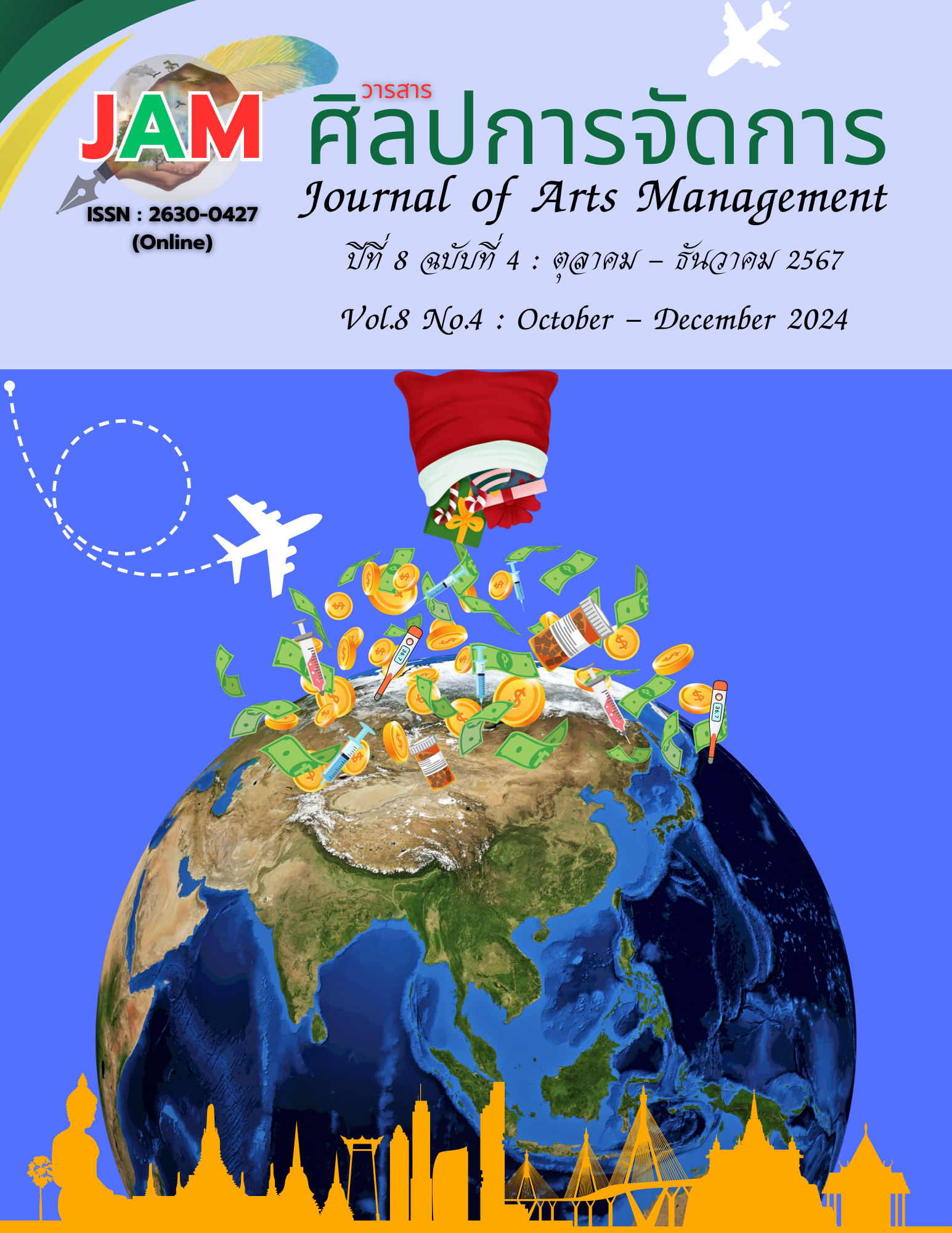Service Competency Development System on People Management Work collaboratively with others and Emotional Intelligence of First-line Supervisors for High Value Tourist in Hotel Industry in the EEC
Main Article Content
Abstract
This research aims to: 1. Develop a system to enhance the service capacity in human resource management, teamwork, and emotional intelligence for first-line managers in the hotel industry to cater to high-income tourists in the Eastern Economic Corridor (EEC). 2. Evaluate the effectiveness of the developed system. The researchers employ a research and development (R&D) approach, utilizing the ADDIE model consisting of five phases: analyze, design, develop, implement, and evaluate. The researchers collected both qualitative and quantitative data for the study. A qualitative research method, including in-depth interviews and focus group discussions with first- and middle-level managers from hotels affiliated with the Eastern Thailand Hotel Association, was employed to collect data. The research results informed the creation of a workshop training course on “Managing Emotional Intelligence in Service and Teamwork for First-Line Managers,” lasting 12 hours and covering four topics: 1. Emotion Management and Positive Psychology; 2. Effective Communication and Teamwork; 3. Leadership, Personal Branding, and Presentation Skills in Service; and 4. Resilience and Change Management. The evaluation results of the developed system indicated that participants' post-training scores improved significantly, and their satisfaction ratings for the course were exceptionally high across all topics.
Article Details

This work is licensed under a Creative Commons Attribution-NonCommercial-NoDerivatives 4.0 International License.
Views and opinions appearing in articles in the Journal of Arts of Management It is the responsibility of the author of the article. and does not constitute the view and responsibility of the editorial team I agree that the article is copyright of the Arts and Management Journal.
References
Abrahamson, D. (1958). The road to emotional maturity. Prentice-Hall.
Cooper, R.K., & Sawaf, A. (1996). Executive EQ: emotional intelligence in leadership and organizations. Perigee Books.
Cooper, R.K., & A. Sawaf. (1997). Executive EQ: emotional intelligence in leadership and organizations. Perigee Books.
Dillenbourg, P. (1999). What do you mean by collaborative learning?. In P. Dillenbourg (Ed.), Collaborative Learning: Cognitive and Computational Approaches (pp.1-19). Pergamon.
Eastern Economic Corridor (EEC) Office. (2019). Eastern Economic Corridor (EEC). https://eeco.or.th/en/why-eec
Gardner, H. (1983). Frames of mind. Basic Book.
Garrison, D. R., & Anderson, T. (2003). E-learning in the 21st century: a community of inquiry framework for design and teaching. Routledge Falmer.
Glaser, B., & Strauss, A. L. (1967). The discovery of grounded theory: strategies for qualitative research. Aldine Publishing Company.
Goleman, D. (1995). Emotional intelligence: Why it can metter more than IQ. Bantam Books.
Goleman, D. (1998). Working with emotional intelligence. Bantam Books.
Holloway, I., & Todres, L. (2010). Grounded theory. In Gerrish, K. Lacey, A. (Eds) The research process in nursing. (6th ed). Wiley Blackwell.
Johnson, D. W., & Johnson, R. T. (1994). Learning together and alone: cooperative, competitive, and individualistic learning. Allyn & Bacon.
Knutson, B., Beck, J., Him, S., & Cha, J. (2006). Identifying the dimensions of the experience construct. Journal of Hospitality & Leisure Marketing, 15(3), 31-47.
MGR Online. (2023, October 28). Chonburi's tourism revenue in September 2023 surpasses 15 billion baht, with high spending from international tourists. Manager Online. https://www.mgronline.com
Polanyi, M. (1966). The tacit dimension. Double day and Company.
Patton, M. Q. (1990). Qualitative evolution and research methods. SAGE.
Sager, C.A. (1994). Implicit learning. Psychological Bulletin, 115(2), 163-196.
Salovey, P., & Mayer, J.D. (1990). Emotional intelligence. Imagination, Cognition, and Personality, 9(3), 185-211.
Salovey, P., Mayer, J.D., Goldman, S.L., Turvey C., & Palfai, T.P. (1995). Emotional attention, clarity and repair: Exploring emotional intelligence using the trait meta-mood scale. In Emotion, disclosure and health, 125-154. Edited by Pennebaker, J.W., ed. American Psychological Association.
Salovey, P., & Sluyter, D. J. (Eds.). (1997). Emotional development and emotional intelligence: Educational implications. Basic Books.
Slavin, R. E. (1996). Research on Cooperative Learning and Achievement: What we know, what we need to know. Contemporary Educational Psychology, 21(4), 343-370.
Sørensen, F., & Jensen, J. F. (2015). Value creation and knowledge development in tourism experience encounters. Tourism Management, 46, 336–346.
Sternberg, R.J. (1977). Intelligence, information processing, and analogical reasoning: The componential analysis of human abilities. Erlbaum.
Sternberg, R.J. (1988). The triarchic mind: A new theory of intelligence. Viking.
Strauss, A. (2003). Qualitative analysis for social scientists. Cambridge University.
Strauss, A. & Corbin, J. (1998). Basics of qualitative research: Techniques and procedures for developing grounded theory. SAGE.
Tantibunyanon, S. (2021). Learning management to enhance resilience competency on cloud technology based on disc model in crisis. Journal of Educational Review Faculty of Education in MCU, 8(1), 361-374.
Punnitamai, W. (2008). Emotional Quotient (EQ): An index for happiness and life success (7th ed.). Chulalongkorn University.
Punnitamai, W. (2008). A research study report on biographical components of students and emotional intelligence: the reality of life beyond a passing trend. Chulalongkorn University.


